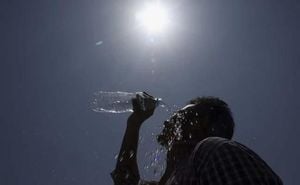On February 19, 2025, Mexico celebrates its Army Day, recognizing the significant role played by the Mexican Army throughout the nation’s history. This year’s commemorations are marked by both pride and controversy, reflecting on the military’s contributions to the country amid rising security concerns and allegations of misconduct.
President Claudia Sheinbaum will preside over the ceremony in Monterrey, Nuevo León. This celebration, like many others, acknowledges the military’s commitment to national security, tranquilizing the populace during tumultuous times. Texts detailing history point out the Army's origin began on February 19, 1913, establishing its role founded on the values of sacrifice, honor, and loyalty.
While commemorations honor the military’s deep-rooted history and contributions, they also come against the backdrop of significant criticism for recent actions. Reports of abuse committed by soldiers, particularly at checkpoints like "El Ribereño," have recently provoked outrage from the public. For example, several used car vendors had 400,000 pesos seized by soldiers, who returned them only after protests led by the vendors.
Local authorities, such as PAN deputy Marina Ramírez Andrade, stated this is not the first time military personnel have been accused of similar acts. She urged military leaders to impose disciplinary actions to prevent such abuses from occurring again. International organizations, including Amnesty International, reported on various incidents where military actions resulted in tragic consequences, stressing the need for accountability.
Despite these troubling incidents, many officers within the Mexican Army continue to serve valiantly against organized crime. Thousands of soldiers have tragically lost their lives, dedicated to combating insecurity across the nation, highlighting the complex role of this institution.
Highlighting its presence on social media, the Mexican Army has transformed its communication approach, utilizing platforms like TikTok and Instagram to connect with younger audiences and disseminate information about their initiatives. With millions of followers across these platforms, the military aims to present itself as engaged and member-centric.
During the annual celebrations, there are high expectations from both the public and military leaders alike. The Army showcases its technically advanced capabilities and military hardware, symbolizing strength. Yet within the framework of remembrance and pride, questions loom about its effectiveness and appropriate deployment, particularly as violence from drug cartels escalates.
Rafael Candela Salinas reflects on the Mexican Army’s historical reliability, stating, "El Ejército Mexicano ha sido históricamente una de las instituciones más confiables, sólidas y reconocidas del país..." compiling collective aspirations for peace and stability.
The clash between the Army’s role as defenders of the nation and their involvement in infrastructure projects under the current government has stirred debate about their primary function. Many citizens express disappointment, wondering if their military's strength should be physically present on construction sites or on the defense of their communities.
Compounding the scrutiny of the Army’s role is the impact of the “hugs, not bullets” policy introduced by former President Andrés Manuel López Obrador, which sought to address violence through social programs rather than direct confrontation with criminal organizations. Critics argue this tactic intensified criminal violence, allowing organized crime to tighten its grip, fostering widespread insecurity.
The intent of sharing thoughts during these military celebrations is multifaceted — to honor the soldiers committed to safeguarding the nation and simultaneously to hold accountable those who may have deviated from their sacred duty of protecting citizens’ rights.
So on this Army Day, the sentiment remains mixed — pride intermingling with caution. The importance of this institution remains undoubtable, but its evolution and primary objectives are under the microscope, with the public demanding clarity on its place within civil society. Will the Mexican Army revert to focusing on its foundational duties or persist as constructors amid burgeoning societal challenges?
With memories of past valor, and hopes for the future, Mexican Army Day stand as not just commemoration but as reflection — urging all to rethink security and accountability as core pillars for a united Mexico.



